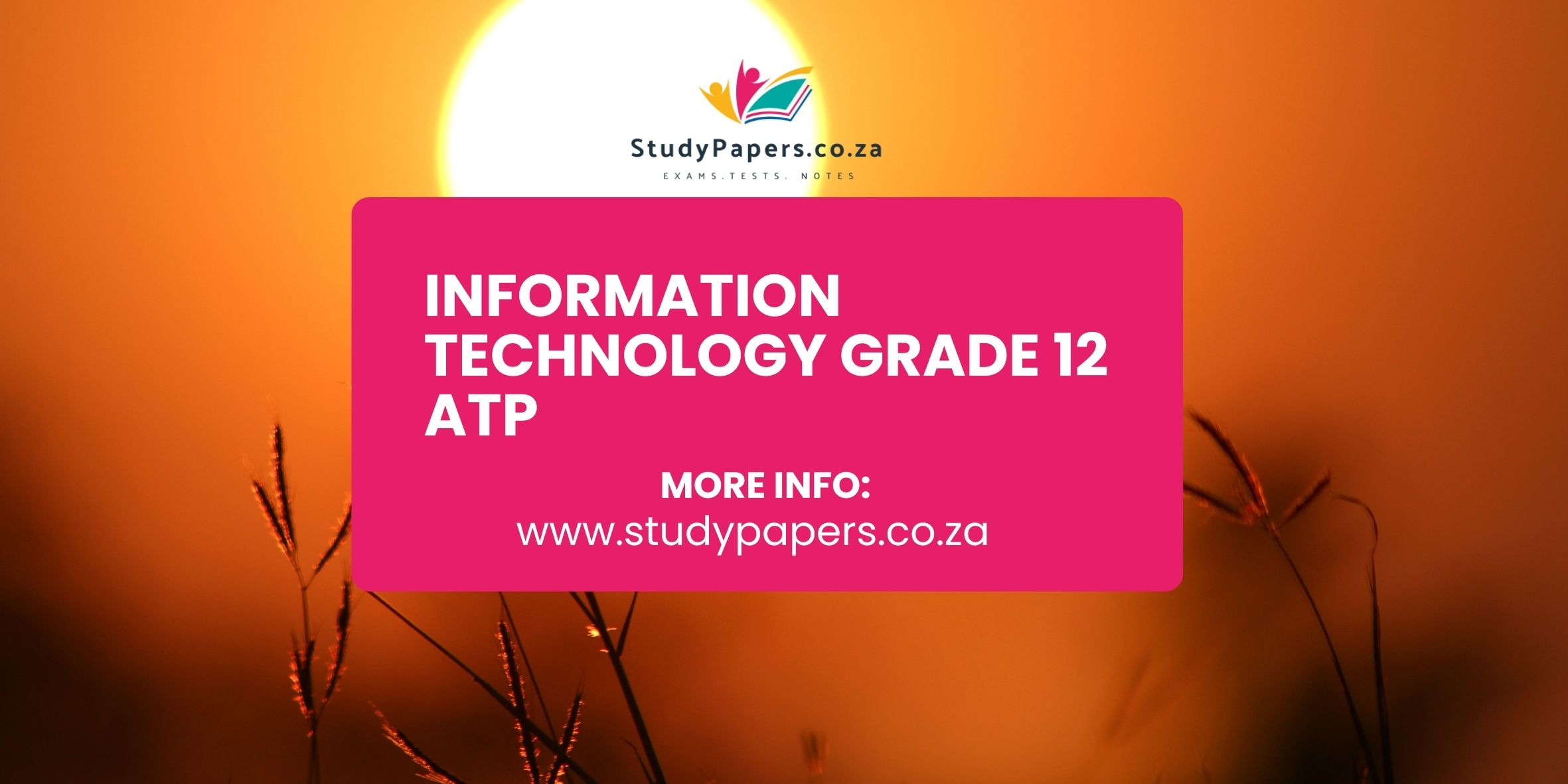The Grade 12 Information Technology (IT) curriculum is a rigorous blend of software development and theoretical computing concepts. For the Class of 2026, the National Senior Certificate (NSC) demands high-level problem-solving skills, specifically in Object-Oriented Programming (OOP) and complex Database Management.
This guide outlines the 2026 Information Technology Annual Teaching Plan (ATP), providing a structured roadmap for mastering Delphi/Java programming, SQL queries, and the critical PAT (Practical Assessment Task).
Download ATP Here in pdf format
Download ATP HereInformation Technology Grade 12 ATP 2026
The curriculum focuses heavily on the Solution Development (Practical) and Systems Technologies (Theory) strands. The PAT is a year-long project that contributes significantly to the final mark.
Term 1: Databases, OOP & PAT Phase 1
Focus: The first term lays the groundwork for advanced database management and higher-level programming concepts like Inheritance.
- Weeks 1–2: Database Design & Concepts
- Design: Relational database design, primary and foreign keys.
- Normalization: Understanding anomalies and converting databases to 1NF, 2NF, and 3NF (Normal Forms).
- Security: Caring for data, managing validation, and preventing hacking.
- Weeks 3–5: Object-Oriented Programming (OOP)
- Revision: Review of classes, objects, and encapsulation.
- Advanced Concepts: Implementation of Inheritance, Polymorphism, and Abstract Classes.
- Methods: Correct use of accessor, mutator, and auxiliary methods.
- Weeks 6–7: Structured Query Language (SQL)
- Basics:
SELECT,WHERE,ORDER BY. - Calculations: Using aggregate functions (
SUM,AVG,COUNT) in queries. - Design: Creating tables and relationships via code.
- Basics:
- Weeks 8–10: PAT Phase 1 (Analysis & Design)
- Identifying the problem and user requirements.
- Designing the GUI (Graphical User Interface) and the Database structure.
- Note: This phase lays the blueprint for your software project.
Term 1 Assessments
- Task 1: Practical Assessment (OOP & SQL).
- Task 2: March Controlled Test (Theory & Practical).
Term 2: Advanced SQL, Social Implications & PAT Phase 2
Focus: The second term deepens technical skills with complex SQL and explores the social and legal implications of computing.
- Weeks 1–2: Advanced SQL
- Complex Queries: Nested queries (sub-queries), grouping data (
GROUP BY), and joining multiple tables. - Data Maintenance:
INSERT,UPDATE, andDELETEstatements.
- Complex Queries: Nested queries (sub-queries), grouping data (
- Weeks 3–4: OOP Consolidation
- Integrating database connections with OOP code.
- Using text files and arrays within objects.
- Weeks 5–7: Social Implications & System Technologies
- Hardware/Software: Latest trends in processing, memory, and software licensing.
- E-Communication: Impact of social media, remote work, and the “Internet of Things” (IoT).
- Social Issues: The digital divide, globalization, and green computing.
- Weeks 8–10: PAT Phase 2 (Coding)
- Developing the software solution using Delphi or Java.
- Implementing the database connection, validation, and core processing logic.
Term 2 Assessments
- Task 3: June Examination (Paper 1: Practical / Paper 2: Theory).
Term 3: Capstone Project & Cyber Security
Focus: The third term finalizes the Practical Assessment Task and covers critical theory regarding cyber crime.
- Weeks 1–3: Social Implications (Cyber Security)
- Cyber Crime: Phishing, pharming, spoofing, and identity theft.
- Malware: Viruses, worms, trojans, ransomware, and keyloggers.
- Protection: Firewalls, anti-virus software, and safe web practices.
- Weeks 4–6: PAT Phase 3 (Finalisation)
- Finalizing the code, adding help files, and ensuring robust error handling.
- Completing the final report and preparing for the demonstration.
- Note: The PAT typically counts for 25% of your final NSC mark.
- Weeks 7–11: Revision & Trial Exams
- Drilling past papers for both Practical (Paper 1) and Theory (Paper 2).
Term 3 Assessments
- Task 4: Trial / Preparatory Examination (150 Marks Practical + 150 Marks Theory).
Term 4: Final Assessment
Focus: The final term is purely for revision and the external NSC examinations.
- Final Assessment:NSC Final Examinations.
- Paper 1 (Practical): 150 Marks (3 Hours) – Lab-based programming exam.
- Paper 2 (Theory): 150 Marks (3 Hours) – Written exam covering Systems, Database Design, and Social Implications.
FAQ: Information Technology Grade 12
Q: Which programming language is used? A: While the curriculum supports OOP languages generally, the resource list in this specific ATP document explicitly mentions Delphi programming software (Version 10, 10.3, 10.4). However, many schools also use Java (NetBeans/IntelliJ). Check with your specific teacher.
Q: What is Normalization in Database Design? A: Normalization is the process of organizing data to reduce redundancy. You need to know how to convert a flat database into Third Normal Form (3NF) by ensuring atomic data, removing partial dependencies, and removing transitive dependencies.
Q: How is the PAT assessed? A: The PAT is assessed in three phases:
- Analysis & Design (Term 1): Planning and database structure.
- Coding (Term 2): Developing the functional program.
- Testing & Reporting (Term 3): Final polish and documentation.

